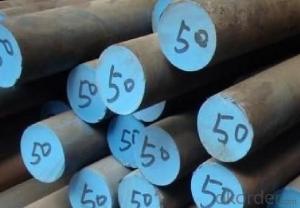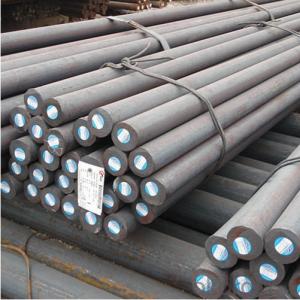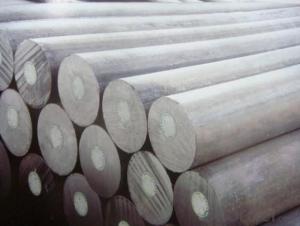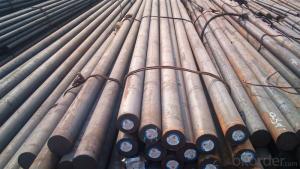SCM440 Alloy Steel Round Bars Hot Forged Bar
- Loading Port:
- Tianjin
- Payment Terms:
- TT OR LC
- Min Order Qty:
- 25 m.t.
- Supply Capability:
- 50000 m.t./month
OKorder Service Pledge
OKorder Financial Service
You Might Also Like
Item specifice
SCM440 Alloy Steel Round Bars Hot Forged Bar
Product Description:
1. Sizes: Diameter: 16mm-300mm; Length: 6m, 9m, 12m
2. Grade: 42CrMo, 4140,42CrMov,SCM440
3. Invoicing on theoretical weight or actual weight as customer’s request
4. Shape: Round bar, solid bar of steel with circular section
5. Technique: Hot rolled, forged, cold rolled
Specification:
Material | SCM440 | Round bar | Dia(mm) | 16-600 |
Process | EAF + LF + VD + Forged + Heat Treatment (optional) | Length (mm) | Max 12000 | |
Heat treatment | Normalized / Annealed / Quenched / tempered | Flat bar | Thickness(mm) | 8-500 |
Delivery condition | Hot forged +Rough machined (black surface after Q/T)+ Turned (optional) | Width(mm) | 70-200 | |
Test | Ultrasonic test according to SEP 1921-84 D/d | Length (mm) | Max 12000 |
Chemical Composition:
C | Si | Mn | Cr | Ni | Cu |
0.38~0.45 | 0.17~0.37 | 0.50~0.80 | 0.9-1.2 | ≤0.030 | ≤0.030 |
Packing and Delivery:
Packing in bundle with steel strips and shipped by break bulk vessel or container (depend on target market and different ports)
Delivery Detail: Approx.45 days
Usage and Applications:
1. SCM440 Alloy Steel Round Bars Hot Forged Bar is used in a large number of architectural and engineering structures. Or it can be used in construction of plants for the production of steel house frames, high-voltage transmission towers, bridges, vehicles, boilers, containers, ships, etc.
2. And we can use this kind of product on the performance of the mechanical parts if the demand is not very high.
3. Some especial material steel round bar can be used for main shaft of steamer, hummer shank, with big section and supper force.
Product Show:
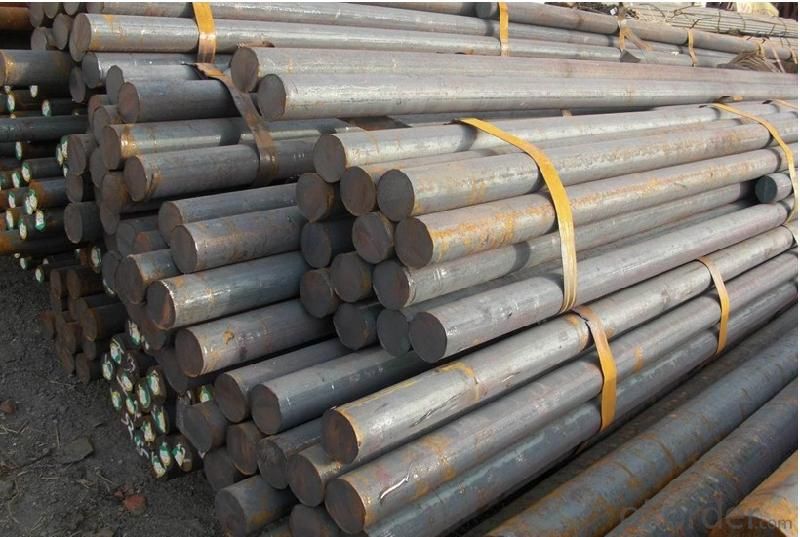
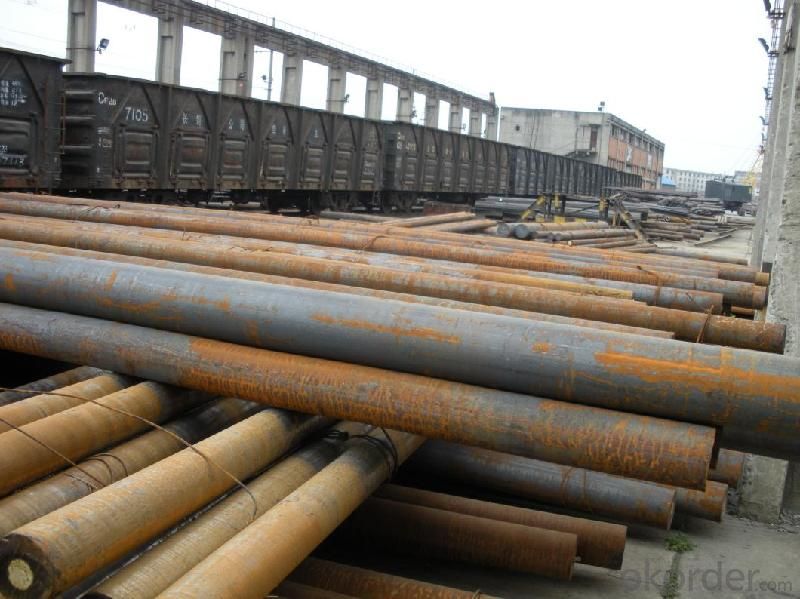
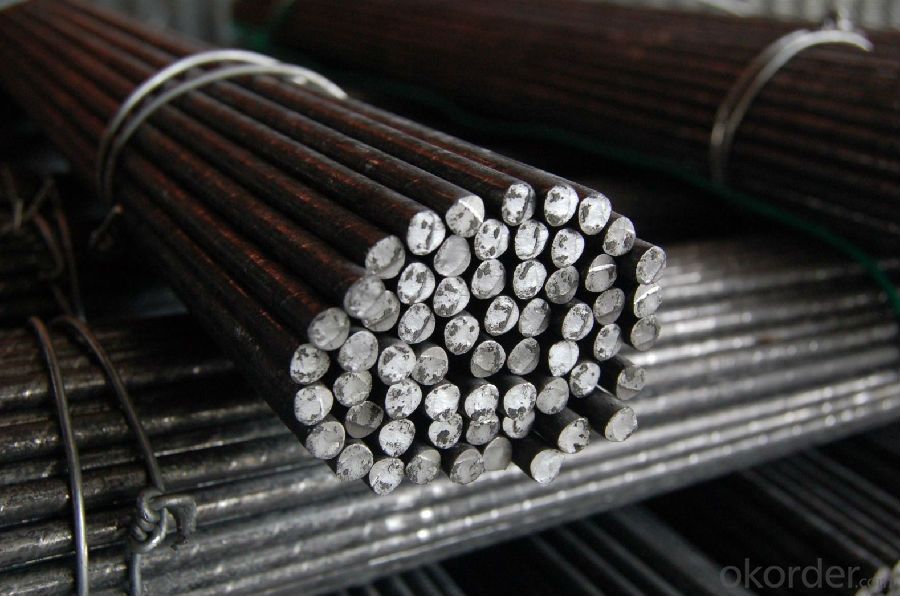
- Q:How is corrosion-resistant stainless steel used in the production of marine equipment?
- Corrosion-resistant stainless steel is extensively used in the production of marine equipment due to its ability to withstand the harsh corrosive environment of saltwater. It is used for various applications such as shipbuilding, offshore structures, and marine components like propellers, valves, and fittings. The stainless steel's resistance to corrosion helps prevent rust and degradation, ensuring the longevity and durability of marine equipment even in challenging marine conditions.
- Q:How does special steel contribute to the automotive racing aftermarket industry?
- Special steel plays a crucial role in the automotive racing aftermarket industry by providing high-performance components that enhance the overall performance and durability of race cars. These components, such as crankshafts, connecting rods, and valve springs, are often subject to extreme conditions and require exceptional strength, heat resistance, and fatigue resistance. Special steel alloys, with their superior mechanical properties, allow for the production of lightweight yet robust parts that can withstand the demanding requirements of racing. This contributes to improved engine efficiency, increased power output, and enhanced reliability, ultimately giving racing enthusiasts a competitive edge on the track.
- Q:How does special steel contribute to the manufacturing of oil and gas equipment?
- Due to its unique properties and characteristics, special steel is essential in the manufacturing of oil and gas equipment. Its high strength and durability make it suitable for the demanding conditions of the industry. Equipment like drilling rigs, pipelines, and storage tanks face extreme pressures, corrosive environments, and harsh weather conditions. Special steel's superior mechanical properties allow it to withstand these conditions and ensure the equipment's reliable and long-lasting performance. Furthermore, special steel's resistance to corrosion and oxidation is highly beneficial in the oil and gas industry. Regular steel quickly deteriorates when exposed to corrosive substances and high temperatures. However, special steel is designed to resist corrosion, ensuring the equipment remains functional and safe over its lifetime. In addition, special steel's ability to withstand high temperatures and pressure differentials makes it suitable for heat exchangers and pressure vessels. These components are crucial in various oil and gas processes, including refining and transportation. Special steel's capability to handle extreme temperatures and pressures ensures the efficiency and safety of these operations. Moreover, special steel contributes to the manufacturing of oil and gas equipment by providing excellent weldability and machinability. This allows for easy fabrication and assembly, reducing production time and costs. The versatility of special steel empowers manufacturers to design and create complex equipment that meets the specific requirements of the oil and gas industry. In conclusion, special steel plays a crucial role in the manufacturing of oil and gas equipment. Its high strength, durability, corrosion resistance, and ability to withstand extreme temperatures and pressures make it an indispensable material in the industry. Special steel ensures the reliability, safety, and longevity of the equipment, making it an essential component in the oil and gas industry.
- Q:What are the properties of heat-resistant steel?
- Heat-resistant steel has several important properties. First, it has a high melting point, allowing it to withstand extremely high temperatures without melting or losing its structural integrity. Additionally, it exhibits excellent strength and toughness, ensuring that it can withstand mechanical stresses even at elevated temperatures. Heat-resistant steel also possesses good oxidation resistance, preventing it from reacting with oxygen and forming destructive oxides when exposed to high temperatures. Furthermore, it has low thermal expansion, which means it maintains its shape and dimensions even under extreme thermal conditions. Overall, these properties make heat-resistant steel highly suitable for applications involving high temperatures, such as in furnaces, boilers, and aerospace components.
- Q:What are the challenges in forging special steel?
- Forging special steel presents several challenges, including selecting the appropriate alloy composition, achieving the desired mechanical properties, and maintaining dimensional accuracy during the forging process. Additionally, special steels often have higher carbon content and alloying elements, making them more prone to cracking, distortion, and heat treatment issues. Controlling the heating and cooling rates, as well as precise temperature management, is crucial to avoid defects and ensure uniformity. Furthermore, the intricate shapes and complex geometries of special steel components require skilled craftsmanship and sophisticated forging techniques to achieve the desired final product quality.
- Q:What are the key characteristics to consider when selecting special steel?
- When selecting special steel, there are several key characteristics that need to be considered. First and foremost is the composition of the steel. The specific elements and their proportions in the alloy play a crucial role in determining the steel's properties such as strength, hardness, and corrosion resistance. Different applications may require different compositions, so it is important to carefully evaluate the intended use and choose a composition that aligns with the desired performance. Another critical characteristic is the steel's mechanical properties. This includes factors such as tensile strength, yield strength, ductility, and toughness. These properties determine how the steel will perform under various loads and impacts, and it is crucial to select a steel with the appropriate mechanical properties for the specific application. Additionally, the steel's heat treatment capabilities should be considered. Special steels often undergo different heat treatment processes to enhance their properties. Factors such as hardenability, tempering ability, and the ability to retain hardness at high temperatures are important considerations when selecting special steel. Corrosion resistance is also a key characteristic, especially when the steel will be exposed to harsh environments or chemicals. Some special steels are designed to have excellent resistance to corrosion, making them suitable for applications in marine environments, chemical processing plants, or oil and gas industries. Other characteristics to consider include machinability, weldability, and cost. Machinability refers to the ease with which the steel can be cut, drilled, or shaped, while weldability determines how well the steel can be welded without compromising its properties. The cost of the steel is an important factor, as it should align with the budget constraints of the project. In summary, when selecting special steel, it is crucial to consider the composition, mechanical properties, heat treatment capabilities, corrosion resistance, machinability, weldability, and cost. By evaluating these key characteristics in relation to the specific application, one can make an informed decision and choose the most suitable special steel for the intended purpose.
- Q:What are the main applications of special steel in the medical implants?
- Special steels have numerous applications in the field of medical implants. They are commonly used in orthopedic implants such as joint replacements, screws, plates, and pins, due to their high strength and corrosion resistance. Special steels are also utilized in cardiovascular implants like stents and pacemaker leads, as they provide excellent biocompatibility and durability. Additionally, special steels find application in dental implants, surgical instruments, and prosthetics, owing to their ability to withstand sterilization processes and maintain mechanical integrity.
- Q:How does special steel perform in terms of magnetic permeability?
- Special steel typically has a lower magnetic permeability compared to other materials, meaning it has a weaker response to magnetic fields.
- Q:How does special steel contribute to the manufacturing of power generation equipment?
- Special steel plays a crucial role in the manufacturing of power generation equipment by providing exceptional strength, durability, and resistance to extreme conditions. It is used in turbine blades, rotors, and other critical components, allowing for higher efficiency and performance. Additionally, special steel's ability to withstand high temperatures and corrosive environments ensures the longevity and reliability of power generation equipment, ultimately contributing to the overall efficiency and effectiveness of power generation processes.
- Q:How is stainless steel used in the food and beverage industry?
- Stainless steel is widely used in the food and beverage industry due to its excellent properties such as corrosion resistance, durability, and hygienic qualities. It is commonly used for manufacturing food processing equipment like tanks, pipes, and storage containers, as well as kitchen appliances and utensils. The non-reactive nature of stainless steel ensures that it does not impart any unwanted taste or odor to the food or beverage being processed or stored, making it a safe and ideal choice for maintaining product quality and safety standards.
1. Manufacturer Overview |
|
|---|---|
| Location | |
| Year Established | |
| Annual Output Value | |
| Main Markets | |
| Company Certifications | |
2. Manufacturer Certificates |
|
|---|---|
| a) Certification Name | |
| Range | |
| Reference | |
| Validity Period | |
3. Manufacturer Capability |
|
|---|---|
| a)Trade Capacity | |
| Nearest Port | |
| Export Percentage | |
| No.of Employees in Trade Department | |
| Language Spoken: | |
| b)Factory Information | |
| Factory Size: | |
| No. of Production Lines | |
| Contract Manufacturing | |
| Product Price Range | |
Send your message to us
SCM440 Alloy Steel Round Bars Hot Forged Bar
- Loading Port:
- Tianjin
- Payment Terms:
- TT OR LC
- Min Order Qty:
- 25 m.t.
- Supply Capability:
- 50000 m.t./month
OKorder Service Pledge
OKorder Financial Service
Similar products
New products
Hot products
Related keywords
